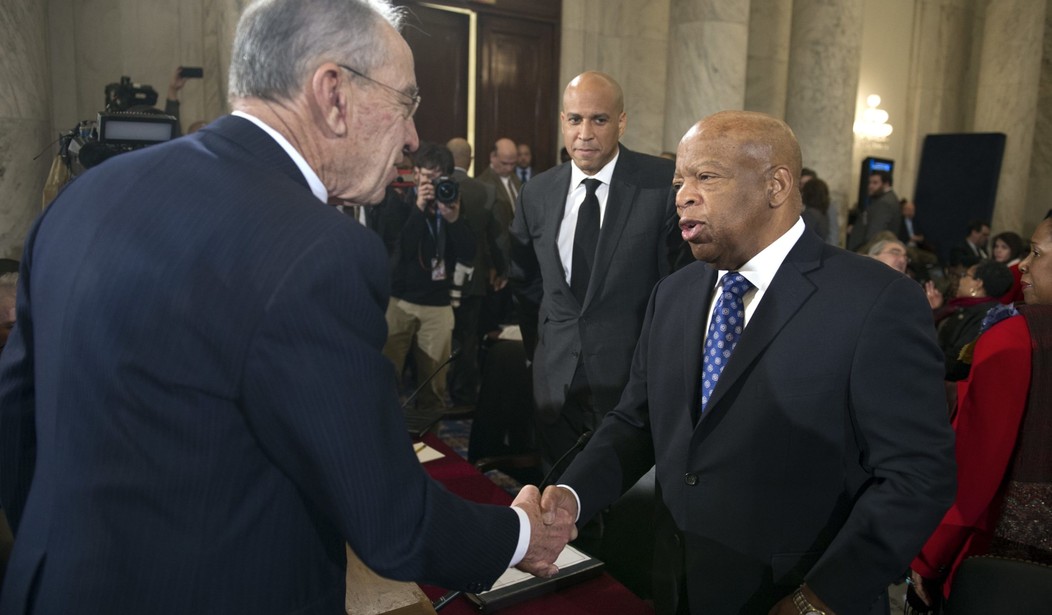WASHINGTON – Civil rights activists were not changing their tune about Sen. Jeff Sessions’ (R-Ala.) nomination after the first day of his confirmation hearing.
Some activists criticized members of the Senate Judiciary Committee for their “collegiality” at the hearing, which began at 9 a.m. on Tuesday and wrapped up for the day more than nine hours later with some breaks in between.
Under questioning from Democrats about existing laws related to abortion and same-sex marriage, Sessions said he would follow and enforce all laws even those that he personally opposes.
“I would respect it and follow it,” Sessions said of Roe v. Wade.
He said the right of same-sex couples to marry is “settled” and told the committee he would follow that Supreme Court decision as well.
Mara Keisling, executive director of the National Center for Transgender Equality, was “unimpressed” with Sen. Sessions’ performance. She blasted the lawmakers at the hearing as “more interested in collegiality than the health of the American justice system.”
“Sessions said today that he ‘understands the demands for justice and fairness made by our LGBT community,’ but it is very clear that he intends to use that understanding only to do harm,” she said on a conference call Tuesday with reporters. “Nothing Sen. Sessions said during today’s hearings changes the fact that he is an extremist who is hostile to civil rights, including those of transgender people and other members of the LGBT community.”
Wade Henderson, president of The Leadership Conference on Civil and Human Rights, shared a similar view.
“The rushed nature of the confirmation process places senatorial collegiality over the advice and consent responsibilities that are the Senate’s constitutional duty,” he said. “We are confident that a more full and public airing of Senator Sessions’ views and beliefs will prove that he is unfit to serve as attorney general.”
Henderson said a senator’s friendship for 20 years with a nominee like Sessions should not serve as a basis for deciding the next attorney general.
“Collegiality is no substitute for the Senate’s responsibility of advice and consent and that must be the standard by which the Judiciary Committee reviews all prospective nominees for this position,” he said.
Thomas Saenz, president and general counsel of the Mexican American Legal Defense and Educational Fund, said the hearing did not change his conclusion that Sessions is “unfit” to serve as attorney general.
“Sessions’ assurances that he will enforce the law cannot override a troubling record of disinterest and even contempt for ensuring that civil rights protections are vigorously implemented,” he said. “We can only conclude that a much deeper examination is required before the Senate could confidently confirm Jeff Sessions.”
Andrew Imparato, executive director of the Association of University Centers on Disabilities, criticized Sessions’ record on “disability rights.”
“When he was attorney general in Alabama he had an opportunity to support the institutionalization and community integration for children and adults with mental disabilities in Alabama, and instead he questioned a consent decree that was a historical consent decree that had been negotiated before him and challenged whether that was good law,” he said.
Imparato also said Sessions opposed U.S. ratification of the UN Convention on the Rights of Persons with Disabilities when other Republicans such as Sen. John McCain (R-Ariz.) had supported its ratification.
Benard Simelton, president of the Alabama State Conference of the NAACP, said Sessions did not say anything that would lead him to change his mind about his nomination.
“He’s been a threat to desegregation and the Voting Rights Act and remains a threat to all of our civil rights, including the right to live without the fear of police brutality,” he said.
A group of African-American religious leaders endorsed Sessions as the next attorney general ahead of the confirmation hearing and pushed back against Rev. Al Sharpton’s criticism of Sessions’ nomination.
As PJM previously reported, Al Sharpton promised a “season of civil disobedience” surrounding the Sessions nomination on a press call with other civil rights activists from organizations including the NAACP and the National Council of La Raza. The activists argued that Sessions should not be attorney general in part because of his support for voter identification laws.
Rev. William Green of Fresh Anointing House of Worship in Montgomery, Ala., argued that Sharpton is “racist” for implying that minorities are unable to obtain a photo ID to show in order to cast their vote.
“I think for any individual, as black man, to tell me that black people can’t go get an ID just like white people can – see, once again, when you say voter ID, it’s not that they are concerned about poor, educated white people, it’s poor, uneducated black people. So what I am saying, to even imply that is racist to me, is racist in itself. So what Al Sharpton is saying, in effect, is that black people are not as educated as white people to be able to get IDs if you require them to get IDs,” Green told PJM.
“Are you saying that white people are superior to black people? So my opinion is Al Sharpton is the racist and I resent that as a black man. Al Sharpton is the racist in implying that black people are less capable than white people in getting IDs simply because of their skin color; that’s my position,” he added.









Join the conversation as a VIP Member